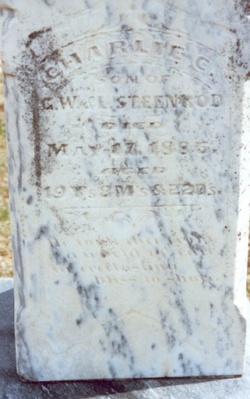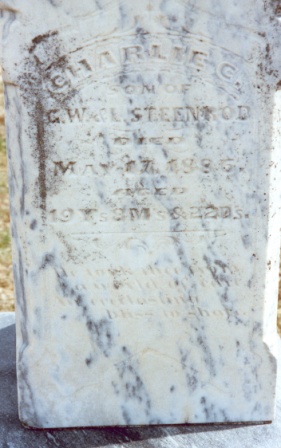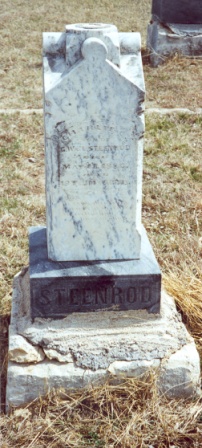Wichita Eagle, May 19, 1886, pg. 6
"A BRIGHT BOY GONE. – Another Victim of the Kansas City Storm. – As is known to many of our local readers, Charles Steenrod, son of ex-Commissioner Steenrod, was in the Kansas City court house when it fell during the late storm. He was connected with a real estate office, and was at the time of the awful calamity making up an abstract of deeds. His name did not appear in the list of hurt, and it was two days, we believe before his father was telegraphed for, who drove in from his home at Colwich and took the train the same evening for Kansas City. Mrs. Steenrod came into the city, but so encouraging was the news from both father and son that she did not go down, as it was thought that Charley would be up in two or three days.
Day before yesterday, however, she received a telegram from the husband announcing the fact that the doctors had decided that her boy was fatally injured internally. The mother and Mrs. Heizerman took the next train, but before they reached the bed side of the suffering boy, his spirit has taken its flight. A dispatch announced that the remains would be put on the next train, and that they would be taken out near his old home and buried in the Eldridge cemetery this morning at 9 o'clock. He had, we believe, just gained his majority.
Charley Steenrod is dead. All that remains of the bright youth who went out from among us a few brief weeks since, his breast pulsating with the hopes and vigor of youthful manhood, will return to his boyhood's home, today, and to his grave. Like a summer rose, christened with the dew of a mother's love in life's white morning, he put forth, but there is only returned to us the ashes of many dreams, wet with tears wrung from stricken hearts. The possibilities of the future and all that he would have wrought; are now less than the shadows which shall lightly kiss the spot where must gently sleep, less than the idle wind that will whisper above him or shriek his requiem among the dead grasses when the summer is done and birds have fled. We can offer no word which would tend to lessen the dull ache of the two hearts which but such a few years since, with such a world of tenderness and trust clasped in their arms, their first born, that boy, whose every look and action, of the swift flying years now flash up from neglected pages of the memory only to lighten up others and by contrast make the heart more sick. We knew your boy, and something of his ambitious, warm impulses and hopeful nature, but you who will today watch the sods of the valley as they hide his loved form forever, knew him closer, better then wherefore any mere words of ours. Charley no doubt lives and sees and comprehends better now than even sages: ‘How must a spirit, late escaped from earth, The truth of things new blazing in its eye, Look back, astonished on the ways of men, Whose lives' whole drift is to forget their graves'"
Wichita Eagle, May 19, 1886, pg. 6
"A BRIGHT BOY GONE. – Another Victim of the Kansas City Storm. – As is known to many of our local readers, Charles Steenrod, son of ex-Commissioner Steenrod, was in the Kansas City court house when it fell during the late storm. He was connected with a real estate office, and was at the time of the awful calamity making up an abstract of deeds. His name did not appear in the list of hurt, and it was two days, we believe before his father was telegraphed for, who drove in from his home at Colwich and took the train the same evening for Kansas City. Mrs. Steenrod came into the city, but so encouraging was the news from both father and son that she did not go down, as it was thought that Charley would be up in two or three days.
Day before yesterday, however, she received a telegram from the husband announcing the fact that the doctors had decided that her boy was fatally injured internally. The mother and Mrs. Heizerman took the next train, but before they reached the bed side of the suffering boy, his spirit has taken its flight. A dispatch announced that the remains would be put on the next train, and that they would be taken out near his old home and buried in the Eldridge cemetery this morning at 9 o'clock. He had, we believe, just gained his majority.
Charley Steenrod is dead. All that remains of the bright youth who went out from among us a few brief weeks since, his breast pulsating with the hopes and vigor of youthful manhood, will return to his boyhood's home, today, and to his grave. Like a summer rose, christened with the dew of a mother's love in life's white morning, he put forth, but there is only returned to us the ashes of many dreams, wet with tears wrung from stricken hearts. The possibilities of the future and all that he would have wrought; are now less than the shadows which shall lightly kiss the spot where must gently sleep, less than the idle wind that will whisper above him or shriek his requiem among the dead grasses when the summer is done and birds have fled. We can offer no word which would tend to lessen the dull ache of the two hearts which but such a few years since, with such a world of tenderness and trust clasped in their arms, their first born, that boy, whose every look and action, of the swift flying years now flash up from neglected pages of the memory only to lighten up others and by contrast make the heart more sick. We knew your boy, and something of his ambitious, warm impulses and hopeful nature, but you who will today watch the sods of the valley as they hide his loved form forever, knew him closer, better then wherefore any mere words of ours. Charley no doubt lives and sees and comprehends better now than even sages: ‘How must a spirit, late escaped from earth, The truth of things new blazing in its eye, Look back, astonished on the ways of men, Whose lives' whole drift is to forget their graves'"
Family Members
Advertisement
Advertisement






